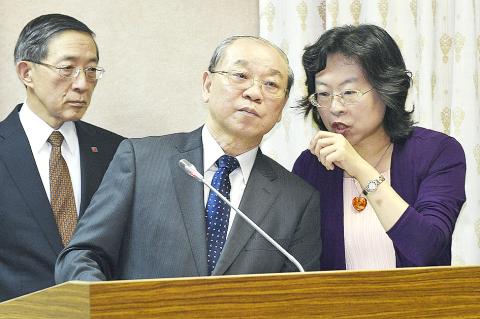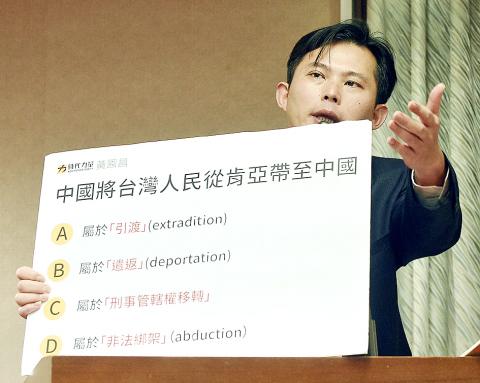After reeling from criticism and public pressure, officials at the Ministry of Justice reversed their stance on the deportation of Taiwanese from Kenya to China, making public statements yesterday to say that Taiwan has legal jurisdiction over its citizens and needs to negotiate with China on the handling of the suspects.
Deputy Minister of Justice Lin Hui-huang (林輝煌) said it came down to an issue of “concurrent jurisdiction,” in that both Taiwan and China have legal jurisdiction with regard to such cases and therefore it must be handled by cross-strait negotiations.
In the Kenya case, in which the suspects allegedly engaged in telecoms fraud, “Taiwan has jurisdiction because it involves Taiwanese nationals, but China insists that it has jurisdiction because the victims are Chinese nationals,” Lin said.

Photo: Chen Chih-chu, Taipei Times
Under such conditions of “concurrent jurisdiction,” the states involved must convene negotiations, he said at the legislature in Taipei.
“Therefore, our ministry will work with the Mainland Affairs Council and the Ministry of Foreign Affairs to attain the result that conforms to the law, while respecting our nation’s dignity and sovereignty,” he said.
Legislators lambasted ministry officials, in particular Tai Tung-li (戴東麗), deputy director of the ministry’s Department of International and Cross-Strait Legal Affairs, who on Tuesday suggested that Beijing had the legal right to deport the Taiwanese to China.

Photo: Chen Chih-chu, Taipei Times
“In the Kenya incident, the whole nation should unite together to help our fellow citizens, but we have some government officials who are letting us down,” Democratic Progressive Party (DPP) Legislator Lo Chih-cheng (羅致政) said. “Tai said China taking our citizens by force from Kenya conforms to principles of international criminal jurisdiction. Why did she take China’s side?”
Fellow DPP Legislator Tsai Shih-ying (蔡適應) questioned Tai’s stance that China’s move conformed to international law.
Tai responded by saying that China has jurisdiction in the case, while Taiwan also has jurisdiction.
China’s Taiwan Affairs Office spokesman An Fongshan (安峰山) yesterday said that Taiwanese should look at the issue from the victims’ viewpoint.
“These offenders carried out their criminal activities in a foreign country. Victims were all Chinese residents, so of course, China has jurisdiction in this case,” An said.
An said China’s justice agencies would conduct a thorough and detailed investigation, during which the legal rights of the Taiwanese suspects would be protected.
He added that many Chinese citizens were victims of the fraud, including the elderly, teachers, students, farmers, laborers and pensioners, some of whom lost their life savings, lost money they needed to treat illnesses or even committed suicide.
Officials at the Chinese Ministry of Public Security yesterday said that they have jurisdiction to investigate the group of suspects.
“In these cases, when Taiwan and China handle it separately, these criminals often do not receive their deserved punishment and we cannot give the defrauded money back to the victims,” the officials said.
In the past two years, officials said Kenyan authorities had arrested 67 people from China and 50 from Taiwan in two major busts of telecom fraud rings targeting people living in Beijing, Jiangsu, Sichuan, Hunan and five other Chinese provinces.

ENDEAVOR MANTA: The ship is programmed to automatically return to its designated home port and would self-destruct if seized by another party The Endeavor Manta, Taiwan’s first military-specification uncrewed surface vehicle (USV) tailor-made to operate in the Taiwan Strait in a bid to bolster the nation’s asymmetric combat capabilities made its first appearance at Kaohsiung’s Singda Harbor yesterday. Taking inspiration from Ukraine’s navy, which is using USVs to force Russia’s Black Sea fleet to take shelter within its own ports, CSBC Taiwan (台灣國際造船) established a research and development unit on USVs last year, CSBC chairman Huang Cheng-hung (黃正弘) said. With the exception of the satellite guidance system and the outboard motors — which were purchased from foreign companies that were not affiliated with Chinese-funded

PERMIT REVOKED: The influencer at a news conference said the National Immigration Agency was infringing on human rights and persecuting Chinese spouses Chinese influencer “Yaya in Taiwan” (亞亞在台灣) yesterday evening voluntarily left Taiwan, despite saying yesterday morning that she had “no intention” of leaving after her residence permit was revoked over her comments on Taiwan being “unified” with China by military force. The Ministry of the Interior yesterday had said that it could forcibly deport the influencer at midnight, but was considering taking a more flexible approach and beginning procedures this morning. The influencer, whose given name is Liu Zhenya (劉振亞), departed on a 8:45pm flight from Taipei International Airport (Songshan airport) to Fuzhou, China. Liu held a news conference at the airport at 7pm,

AIR SUPPORT: The Ministry of National Defense thanked the US for the delivery, adding that it was an indicator of the White House’s commitment to the Taiwan Relations Act Deputy Minister of National Defense Po Horng-huei (柏鴻輝) and Representative to the US Alexander Yui on Friday attended a delivery ceremony for the first of Taiwan’s long-awaited 66 F-16C/D Block 70 jets at a Lockheed Martin Corp factory in Greenville, South Carolina. “We are so proud to be the global home of the F-16 and to support Taiwan’s air defense capabilities,” US Representative William Timmons wrote on X, alongside a photograph of Taiwanese and US officials at the event. The F-16C/D Block 70 jets Taiwan ordered have the same capabilities as aircraft that had been upgraded to F-16Vs. The batch of Lockheed Martin

GRIDLOCK: The National Fire Agency’s Special Search and Rescue team is on standby to travel to the countries to help out with the rescue effort A powerful earthquake rocked Myanmar and neighboring Thailand yesterday, killing at least three people in Bangkok and burying dozens when a high-rise building under construction collapsed. Footage shared on social media from Myanmar’s second-largest city showed widespread destruction, raising fears that many were trapped under the rubble or killed. The magnitude 7.7 earthquake, with an epicenter near Mandalay in Myanmar, struck at midday and was followed by a strong magnitude 6.4 aftershock. The extent of death, injury and destruction — especially in Myanmar, which is embroiled in a civil war and where information is tightly controlled at the best of times —